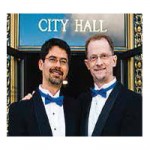 By Stuart Gaffney and John Lewis
By Stuart Gaffney and John Lewis
When Dr. Magnus Hirschfeld and other gay rights pioneers founded the first LGBT rights advocacy organization in the world in Berlin, Germany, in 1897, did they envision revelers at Berlin’s famous Brandenburg Gate, just meters from the Reichstag, the seat of the German government, celebrating the attainment of marriage equality in Germany 120 years later? Perhaps they actually did. Back in 1919, Hirschfeld prophesied: “Soon the day will come when science will win victory over error, justice a victory over injustice, and human love a victory over human hatred and ignorance.”
A century later, Maik Beermann, one of the 393 German Parliamentarians voting in favor of equality put it simply: “As a father, I want my daughters to grow up in a country where they enjoy the same rights and responsibilities as everyone else, regardless of whether they love men or women.” And Thomas Oppermann, the parliamentary leader of the Social Democratic Party proclaimed: “If the Constitution guarantees one thing, it is that anyone in this country can live as they wish.”
Marriage equality in Germany is hugely significant for many reasons. Today, Germany plays an increasingly leading role in maintaining a unified Europe and, in recent years, has accepted hundreds of thousands of refugees from the Middle East, North Africa, and other places. Full marriage equality conveys the importance of dignity and respect for LGBT people to the rest of Europe and to new immigrants arriving from around the world.
Activists hope that momentum from the victory in Germany will bring equality to neighboring Switzerland and Austria, both German-speaking countries. Kathrin Bertschy of Switzerland’s Green Liberal Party told the TagesAnzeige newpaper that with the German vote “[m]arriage for all is now unstoppable internationally.” Cédric Wermuth of the Swiss Social Democratic Party tweeted: “Switzerland must follow suit NOW. Discrimination is the only thing that is perverted.” Thousands of people also recently marched demanding marriage equality in Northern Ireland, the only part of the United Kingdom without equality. The country of Malta is poised to enact marriage equality in July.
Further, the German victory underscores the importance of strategic political organizing by proponents of LGBT rights, even when they do not hold parliamentary majorities in government. For years, marriage equality was stalled in Germany because German Chancellor Angela Merkel refused to let the issue come to a vote in Parliament, despite the fact that a January 2017 Federal Anti-Discrimination Bureau poll showed a staggering 83 percent of the public in favor of marriage equality.
But Germany will hold elections in September, and the Social Democratic Party, a key coalition partner with Merkel’s Christian Democratic Party in the current coalition government, and the Green Party announced in late June they would make marriage equality legislation a condition for any future coalition governing agreement. Within days Merkel called for a Parliamentary vote where members were free to vote their conscience, and within the week, Parliament passed marriage equality with 75 members of Merkel’s party voting in favor.
Although Merkel voted against marriage equality, she strongly urged unity after the vote, hoping the vote would engender “social peace and togetherness.” With her words, she appeared to be attempting to set a tone of less polarization and divisiveness in the society. On the other side of the world, Australian Prime Minister Malcolm Turnbull, who claims to support marriage equality but is blocking a free conscience vote in the Australian Parliament despite clear public support for equality, would do well to follow Merkel’s example.
The LGBT rights movement in Germany did not follow a linear upwards trajectory since its beginning in 1897. One of most enduring images of persecution of LGBT people in the West is the pink triangle that gay male prisoners were forced to wear in the Nazi concentration camps. Beginning in the 1970s, the LGBT rights movement reclaimed the pink triangle as a symbol of bravery and pride (see page 6), and today Germany has marriage equality, a key element in the critical process of integrating protections for LGBT people into the institutions of society. The triumph embodies Magnus Hirschfeld’s vision of the victory of “human love … over human hatred and ignorance,” “science … over error,” and “justice … over injustice”—a vision just as relevant to the world today as it was a century ago.
John Lewis and Stuart Gaffney, together for over three decades, were plaintiffs in the California case for equal marriage rights decided by the California Supreme Court in 2008. Their leadership in the nationwide grassroots organization Marriage Equality USA contributed in 2015 to making same-sex marriage legal nationwide.
Recent Comments